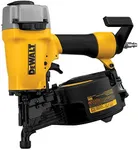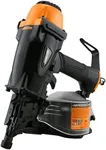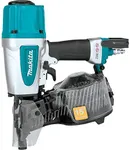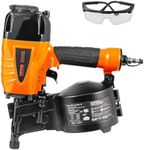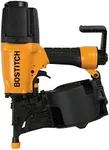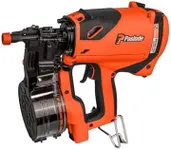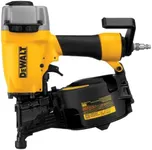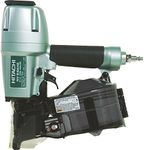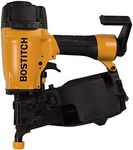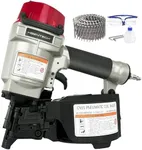Buying Guide for the Best Coil Siding Nailers
Choosing the right coil siding nailer can make your construction or renovation projects much easier and more efficient. A coil siding nailer is a specialized tool used for driving nails into siding materials, such as wood, vinyl, or fiber cement. When selecting a coil siding nailer, it's important to consider several key specifications to ensure you get the best fit for your needs. Understanding these specs will help you make an informed decision and choose a tool that will perform well for your specific tasks.Nail Size CompatibilityNail size compatibility refers to the range of nail lengths and diameters that the nailer can handle. This is important because different siding materials and projects may require different nail sizes. Typically, coil siding nailers can accommodate nails ranging from 1-1/4 inches to 2-1/2 inches in length. If you are working with thicker or harder materials, you may need longer nails for better holding power. Conversely, shorter nails may be sufficient for lighter materials. Consider the types of projects you will be working on and choose a nailer that supports the appropriate nail sizes for those tasks.
Magazine CapacityMagazine capacity indicates the number of nails the nailer can hold at one time. This is important because a larger magazine capacity means fewer interruptions to reload nails, which can increase your efficiency. Coil siding nailers typically have a magazine capacity ranging from 200 to 400 nails. If you have large projects or prefer to work without frequent reloading, a nailer with a higher magazine capacity would be beneficial. For smaller projects or occasional use, a lower capacity may be sufficient.
WeightThe weight of the coil siding nailer is an important factor to consider, especially if you will be using the tool for extended periods. Heavier nailers can cause fatigue and strain, while lighter models are easier to handle and maneuver. Coil siding nailers generally weigh between 4 to 8 pounds. If you have a lot of nailing to do or will be working overhead, a lighter nailer will be more comfortable to use. However, if you need a more robust and durable tool, you might opt for a slightly heavier model.
Depth AdjustmentDepth adjustment allows you to control how deep the nails are driven into the material. This is important for achieving a professional finish and ensuring the nails are properly set without damaging the siding. Most coil siding nailers come with a tool-free depth adjustment feature, which makes it easy to adjust the depth on the fly. If you work with different types of siding materials or need precise control over nail depth, look for a nailer with an easy-to-use depth adjustment mechanism.
Operating PressureOperating pressure refers to the air pressure required for the nailer to function properly, usually measured in pounds per square inch (PSI). This is important because it determines the power and efficiency of the nailer. Most coil siding nailers operate within a range of 70 to 120 PSI. Ensure that your air compressor can provide the necessary pressure for the nailer you choose. If you need more power for tougher materials, look for a nailer that operates at the higher end of the pressure range.
Durability and Build QualityDurability and build quality are crucial for ensuring that your coil siding nailer can withstand the demands of your projects and last for a long time. Look for nailers made from high-quality materials, such as aluminum or magnesium, which offer a good balance of strength and weight. Additionally, consider features like rubberized grips and protective guards that can enhance the tool's longevity and comfort. If you plan to use the nailer frequently or in harsh conditions, investing in a durable and well-built model is essential.
